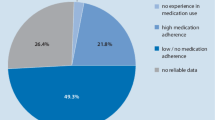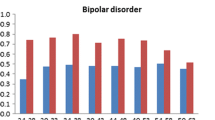Abstract
Patients with schizophrenia or schizoaffective disorder have a high prevalence of comorbid cannabis use disorder (CUD). CUD has been associated with poorer outcomes in patients. We compared doses of antipsychotic medications at the time of discharge from hospital among inpatients with schizophrenia or schizoaffective disorder with or without concurrent cannabis use. We reviewed the medical records of patients (N = 8157) with schizophrenia or schizoaffective disorder discharged from the hospital between 2008 and 2012. The patients were divided into two groups; those with urine drug tests positive for cannabis and those negative for cannabis. Doses of antipsychotic medications were converted to chlorpromazine equivalents. Bivariate analyses were done with Student’s t test for continuous variables and χ 2 test for categorical variables. Linear regression was carried out to adjust for potential confounders. Unadjusted analysis revealed that the cannabis positive group was discharged on lower doses of antipsychotic medication compared with the cannabis negative group (geometric mean chlorpromazine equivalent doses 431.22 ± 2.20 vs 485.18 ± 2.21; P < 0.001). However, the difference in geometric mean chlorpromazine equivalent doses between the two groups was no longer significant after adjusting for sex, age, race, and length of stay (geometric mean difference 0.99; 95 % CI 0.92–1.10). Though limited by lack of information on duration, amount and severity of cannabis use, as well as inability to control for other non-antipsychotic medications, our study suggests that cannabis use did not significantly impact on doses of antipsychotics required during the periods of acute exacerbation in patients with schizophrenia or schizoaffective disorder.
Similar content being viewed by others
References
Black DW, Andreasen NC: Introductory Textbook of Psychiatry, 6th edn., Washington, DC, American Psychiatric Publishing, Inc, 2014.
Reininghaus U, Dutta R, Dazzan P, Doody GA, Fearon P, Lappin J, Heslin M, Onyejiaka A, Donoghue K, Lomas B, Kirkbride JB, Murray RM, Croudace T, Morgan C, Jones PB: Mortality in schizophrenia and other psychoses: A 10-year follow-up of the ӔSOP first-episode cohort. Schizophrenia Bulletin, 2014 [Epub ahead of print].
Fitch K, Iwasaki K, Villa KF: Resource utilization and cost in a commercially insured population with schizophrenia. American Health & Drug Benefits 7(1):18–26, 2014.
Malaspina D, Owen MJ, Heckers S, Tandon R, Bustillo J, Schultz S, Barch DM, Gaebel W, Gur RE, Tsuang M, Van Os J, Carpenter W: Schizoaffective disorder in the DSM-5″. Schizophrenia Research 150(1):21–25, 2013. doi:10.1016/j.schres.2013.04.026.
Cardno AG, Rijsdijk FV, Sham PC, Murray RM, McGuffin P: A twin study of genetic relationships between psychotic symptoms. American Journal of Psychiatry 159(4):539–545, 2002.
Cardno AG, Owen MJ: Genetic relationships between schizophrenia, bipolar disorder, and schizoaffective disorder. Schizophrenia Bulletin 40(3):504–515, 2014.
Du Y, Liu J, Sui J, He H, Pearlson GD, Calhoun VD: Exploring difference and overlap between schizophrenia, schizoaffective and bipolar disorders using resting-state brain functional networks. IEEE Conference on Proceedings of Engineering in Medicine and Biology Society 2014:1517–1520, 2014.
American Psychiatric Association: Diagnostic and Statistical Manual of Mental Disorders, 5th edn., Arlington, American Psychiatric Publishing, 2013.
Rodrigo C, Rajapakse S: Cannabis and Schizophrenia spectrum disorders: A review of clinical studies. Indian Journal of Psychological Medicine 31(2):62–70, 2009.
Golub AL (Ed): The Cultural/Subcultural Contexts of Marijuana Use at the Turn of the Twenty-First Century. New York, Routledge, 2005.
Yamamoto T, Takada K: Role of cannabinoid receptor in the brain as it relates to drug reward. The Japanese Journal of Pharmacology 84(3):229–236, 2000.
Schubart CD, Sommer IE, Fusar-Poli P, de Witte L, Kahn RS, Boks MP: Cannabidiol as a potential treatment for psychosis. European Neuropsychopharmacology 24(1):51–64, 2014.
ElSohly MA, Ross SA, Mehmedic Z, Arafat R, Yi B, Banahan 3rd BF: Potency trends of delta9-THC and other cannabinoids in confiscated marijuana from 1980-1997. Journal of Forensic Sciences 45(1):24–30, 2000.
Radhakrishnan R, Wilkinson ST, D’Souza DC: Gone to Pot—A review of the association between cannabis and psychosis. Front Psychiatry 5:54, 2014.
Koskinen J, Löhönen J, Koponen H, Isohanni M, Miettunen J: Rate of cannabis use disorders in clinical samples of patients with schizophrenia: a meta-analysis. Schizophrenia Bulletin 36(6):1115–1130, 2010.
Linszen DH, Dingemans PM, Lenior ME: Cannabis abuse and the course of recent-onset schizophrenic disorders. Archives of General Psychiatry 51(4):273–279, 1994.
Foti DJ, Kotov R, Guey LT, Bromet EJ: Cannabis use and the course of schizophrenia: 10-Year follow-up after first hospitalization. American Journal of Psychiatry 167(8):987–993, 2010.
D’Souza DC, Abi-Saab WM, Madonick S, et al.: Delta-9-tetrahydrocannabinol effects in schizophrenia: Implications for cognition, psychosis, and addiction. Biological Psychiatry 57(6):594–608, 2005.
Addington J, Duchak V: Reasons for substance use in schizophrenia. Acta Psychiatrica Scandinavica 96(5):329–333, 1997.
Brunette MF, Mueser KT, Xie H, Drake RE: Relationships between symptoms of schizophrenia and substance abuse. The Journal of Nervous and Mental Disease 185(1):13–20, 1997.
Fowler IL, Carr VJ, Carter NT, Lewin TJ: Patterns of current and lifetime substance use in schizophrenia. Schizophrenia Bulletin 24(3):443–455, 1998.
Goswami S, Mattoo SK, Basu D, Singh G: Substance‐abusing schizophrenics: Do they self‐medicate? The American Journal on Addictions 13(2):139–150, 2004.
Schnell T, Koethe D, Krasnianski A, Gairing S, Schnell K, Daumann J, Gouzoulis-Mayfrank E. Ziprasidone versus clozapine in the treatment of dually diagnosed (DD) patients with schizophrenia and cannabis use disorders: A randomized study. American Journal on Addictions 23(3):308–312, 2014.
Baker AL, Hides L, Lubman DI: Treatment of cannabis use among people with psychotic or depressive disorders: A systematic review. Journal of Clinical Psychiatry 71(3):247–254, 2010.
Makkos Z, Fejes L, Inczédy-Farkas G, Kassai-Farkas A, Faludi G, Lazary J: Psychopharmacological comparison of schizophrenia spectrum disorder with and without cannabis dependency. Progress in Neuro-Psychopharmacology & Biological Psychiatry 35(1):212–217, 2011. doi:10.1016/j.pnpbp.2010.11.007.
Dervaux A, Laqueille X, Bourdel MC, Leborgne MH, Olié JP, Lôo H, Krebs MO: [Cannabis and schizophrenia: demographic and clinical correlates]. Encephale 29(1):11–17, 2003.
Andreasen NC, Pressler M, Nopoulos P, Miller D, Ho BC: Antipsychotic dose equivalents and dose-years: A standardized method for comparing exposure to different drugs. Biol Psychiatry 67(3):255–262, 2010.
Paul BP, Mell LD, Mitchell JM, McKinley RM: Detection and quantification of 11-nor-delta-9-tetrahydrocannabinol-9-carboxylic acid, A metabolite of tetrahydrocannabinol, by capillary gas chromatography and electron impact mass spectrometry. Journal of Analytical Toxicology 11:1–5, 1987.
Di Forti M, Marconi A, Carra E, Fraietta S, Trotta A, Bonomo M, Bianconi F, Gardner-Sood P, O’Connor J, Russo M, Stilo SA, Marques TR, Mondelli V, Dazzan P, Pariante C, David AS, Gaughran F, Atakan Z, Iyegbe C, Powell J, Morgan C, Lynskey M, Murray RM: Proportion of patients in south London with first-episode psychosis attributable to use of high potency cannabis: A case-control study. Lancet Psychiatry 2(3):233–238, 2015.
Power R, Verweij K, Zuhair M, et al: Genetic predisposition to schizophrenia associated with increased use of cannabis. Molecular Psychiatry 19:1201–1204, 2014.
Giordano GN, Ohlsson H, Sundquist K, Sundquist J, Kendler K: The association between cannabis abuse and subsequent schizophrenia: A Swedish national co-relative control study. Psychological Medicine 45:407–414, 2015.
Volk DW, Lewis DA: The role of endocannabinoid signaling in cortical inhibitory neuron dysfunction in schizophrenia. Biological Psychiatry, 2015. doi:10.1016/j.biopsych.2015.06.015.
Author information
Authors and Affiliations
Corresponding author
Ethics declarations
Conflict of interest
The authors declare that they have no conflict of interest.
Ethical approval
All procedures performed in studies involving human participants were in accordance with the ethical standards of the institutional and/or national research committee and with the 1964 Helsinki declaration and its later amendments or comparable ethical standards.
Informed consent
This study was retrospective in nature and for this type of study formal consent is not required. All the participants were de-identified and only aggregated data was used to analyze and report results.
Rights and permissions
About this article
Cite this article
Babatope, T., Chotalia, J., Elkhatib, R. et al. A Study of the Impact of Cannabis on Doses of Discharge Antipsychotic Medication in Individuals with Schizophrenia or Schizoaffective Disorder. Psychiatr Q 87, 729–737 (2016). https://doi.org/10.1007/s11126-016-9426-2
Published:
Issue Date:
DOI: https://doi.org/10.1007/s11126-016-9426-2




